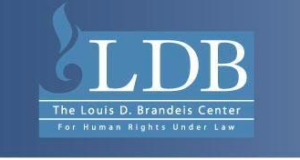WASHINGTON, D.C. (Press Release) — During a panel on rising antisemitism and ways to address it in the workplace, Equal Employment Opportunity Commission (EEOC) Commissioner Andrea Lucas, for the very first time, commented on the Brandeis Center’s complaint of antisemitism at Stanford University, calling the allegations, “deeply troubling.”

Lucas specifically highlighted serious concerns about the “segregation of Jewish employees in white affirming and white passing affinity groups, separated out from other individuals of color” that allegedly took place in one of Stanford University’s Diversity, Equity and Inclusion (DEI) programs as well as DEI leaders “dismissing allegations of Zoom bombings with swastikas out of concern that it would draw attention away from anti-Black anti-racism concerns.”
The Brandeis Center complaint against Stanford was filed in June and is currently being reviewed by the EEOC and the California Department of Fair Employment and Housing (DFEH). It alleges that Stanford University’s Counseling & Psychological Services (CAPS) division has created and fostered a hostile and unwelcoming environment for Jews in its DEI program, in violation of Title VII of the Civil Rights Act of 1964 and California’s Fair Employment and Housing Act.
Lucas’ comments took place during a public webinar, hosted by the Brandeis Center, on ways to combat anti-Jewish discrimination and harassment in the workplace amid a nationwide surge of antisemitism. The purpose of the webinar was to increase awareness and make sure that if people are feeling discriminated against or harassed, they know how to report it.
During the section devoted to educating the public about actions and behavior prohibited under Title VII, Lucas and EEOC Commissioner Keith Sonderling noted that, in addition to religion, antisemitism can involve discrimination, harassment or retaliation related to national origin, race, color or even genetic information. And they cited a number of specific examples of ways antisemitism is currently manifesting in the workplace including, telling Jewish employees that Jews are powerful members of society who contribute to systemic racism, characterizing all Jewish people as privileged based on assumptions about their race or color, circulating conspiracy theories about COVID-19 or vaccines that blame Jews, trivializing the Holocaust by comparing it to mask or vaccine mandates, placing a swastika on a desk of a Jewish employee or via a Zoom bombing, and disproportionate criticism of Israel or conflation of all Jews with Israel. The Commissioners also advised employers on best practices for preventing antisemitism and how to address it if it does occur.
Kenneth L. Marcus, founder of the Brandeis Center and former U.S. Assistant Secretary of Education for Civil Rights, who moderated the panel, noted that “frighteningly many of the examples cited by the Commissioners are exactly what we saw take place at Stanford University and we don’t want repeated in other DEI programs. These behaviors completely undermine the purpose for which DEI programs are developed.”
The Commissioners also noted that employers, like Stanford, are responsible for “specifically address[ing] antisemitism in anti-harassment, anti-discrimination, and diversity trainings, initiatives and policies” and “carefully audit[ing] DEI-anti-racism, content and provide[ing] implementation training, to ensure that these efforts do not contribute to antisemitism, including through assumptions, stereotypes of power, privilege, racial identity or conclusions based on racial/ethnic disparities.”
According to the Brandeis complaint, Stanford’s CAPS DEI program has advanced anti-Semitic tropes concerning Jewish power, conspiracy, and control and endorsed the narrative that Jews support white supremacy and contribute to systemic racism. The complaint alleges the DEI program refused to address incidents of antisemitism, including swastika vandalism and that it excluded antisemitism from the program’s agenda and silenced and intimidated Jews who have spoken up to challenge the program’s failure to discuss incidents of Jew-hatred at Stanford.
For example, during a virtual townhall for the Stanford community, unknown participants hijacked the meeting and shared racist messages that displayed images of swastikas and weapons and used the N-word. This incident caused widespread distress among members of Stanford’s student body due to the racist and anti-Semitic nature of the attack. At the next DEI meeting, DEI committee members addressed the racist and anti-Black content but did not mention the anti-Semitic images of swastikas. When asked about that, the answer was that the DEI committee intentionally decided to omit any mention of antisemitism so as not to dominate the discussion about anti-Black racism. Later, when swastikas were discovered inside Stanford’s Memorial Church, again, the DEI program ignored the incident in its next meeting. This offensive behavior presents staff with the canard that they must choose between opposing antisemitism or fighting anti-Black racism.
In addition, during a presentation to pre-doctoral students with information about CAPS internship and training opportunities, one of the presenters discussed a program that will explore how Jews are connected to white supremacy, and another presenter recommended a book that portrays the Jewish State of Israel as a racist endeavor. On another occasion a DEI committee member accused a Jewish member of the committee of being racist due to her Jewish identity. In addition, DEI committee members made repeated offensive and derogatory remarks toward both Jewish members of the committee, invoking classic anti-Semitic tropes, using ethnic and racial stereotypes of Jews as well as insults and put-downs about Jews.
To date, Stanford has refused to recognize the problem or take appropriate corrective action to address it.
*
Preceding provided by the Louis D. Brandeis Center